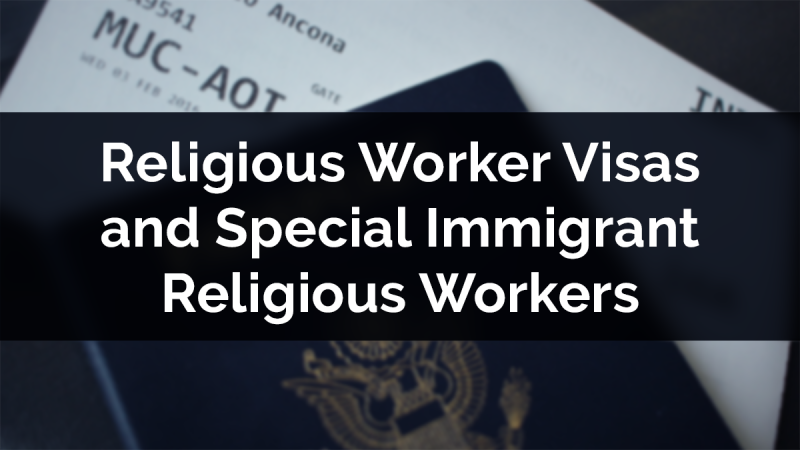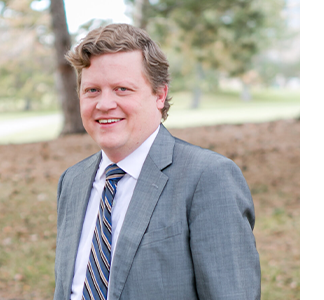Guest Post: Religious Worker Visas and Special Immigrant Religious Workers

The mission of the Church, unlike secular organizations, is a universal calling to reach all nations irrespective of international borders. Indeed, the Gospels instruct followers to go forth and make disciples of all the nations. While the Apostle Paul’s Roman Citizenship helped enable him to travel, establish, and visit churches in places like Corinth, Rome, Galatia, Ephesus and Thessalonica, there is no equivalent for Roman Citizenship today. Today’s ministers and missionaries must contend with the Immigration Laws of the country they wish to enter. For those seeking to come to the United States (and churches and religious organizations seeking to have foreign missionaries enrich their ministries), this means dealing with the alphabet of Visas, prohibitions, and requirements found in the Immigration and Nationality Act and its attendant regulations.
The R visa allows a religious organization to bring a religious worker to the United States, it is renewable but has maximum time period of five years. On the other hand, the Special Immigrant Visa provides a way for an applicant to receive Permanent Residence, commonly known as a green card.
In general, the requirements for these two paths are similar. In fact, in some circumstances, they may be used in combination. Of course, the determination of which Visa is best requires an individualized assessment that depends on an evaluation of the specific needs of the religious organization and the needs and circumstances of the religious worker.
In either case, both the worker and the religious organization must meet certain requirements.
First, the sponsoring organization must be a bona fide non-profit religious organization. This means the organization must have IRS recognition of its 501(c)(3) status or as the affiliate of such an organization. The organization must belong to a religious denomination. The government defines denomination as a community of believers governed by a common ecclesiastical government with a common form of worship, a common doctrine, common codes or doctrines, common services or ceremonies, common places of worship, or some other comparable indication of belonging to a denomination. Except in some cases where the worker is a self-supporting missionary, the church must show that it is able and willing to compensate the religious worker.
Meanwhile, the religious worker must be either a minister or someone coming to work in a religious occupation or vocation. The worker must have been a member of the religious denomination for at least the past two years, and must be coming solely as a minister or to perform a religious vocation or occupation. Finally, the worker must be coming to, or remaining in, the United States at the request of and to work for the religious organization.
In the case of the R Visa, the worker must be coming to the United States to work at least in a part time position (working an average of at least 20 hours per week). Religious workers coming under the Special Immigrant Religious Worker status must work at least 35 hours per week.
Who is a religious worker?
The United States Immigration Code characterizes pastors, ministers and missionaries as religious workers.
Government regulations divide Religious workers are into three classes of candidates, 1) Ministers, 2) Religious Vocations, and 3) Religious Occupations.
Of the three qualifying types of candidates, Ministers and Religious Vocations have straight-forward definitions.
Ministers are people who have formal training and authorization to act as clergy and perform the duties of a minister within their religious denomination. The minister must meet the denomination’s established educational and professional requirements and cannot be a lay minister.
The Religious Vocations class is categorized by people who, while not ministers, have a lifetime commitment through vows, such as monks and nuns.
The group that presents more challenges is Religious Occupations. Working for a church does not necessarily qualify someone as working in a religious occupation, in fact those workers whose jobs include solely administrative or support roles are not eligible. The statutes specifically state that: these workers may not be administrative or support personnel such as janitors, maintenance workers, clerical employees, fundraisers, or persons involved in soliciting donations. But a worker performing a role that advances the organization’s religious mission, while performing administrative or support duties incidental to their primary task, would be eligible.
A word of caution, this article is meant to give a brief overview of the federal immigration laws applying to religious organizations. Please keep in mind that immigration law is complicated, often changing based on changing political winds, and that, each case presents unique issues based on organizational, denominational, personal, and immigration histories. A discussion of all possibilities is beyond the scope of this article.
The views and opinions expressed in this guest post belong to the author, who is responsible for its content, and do not necessarily reflect the views of Telios Law PLLC.
About Derek Schroeder
 Derek protects businesses, non-profits, individuals, and families. He provides courtroom representation for clients in commercial and criminal litigation, counsels with immigration solutions for businesses and individuals, and helps individuals and families secure their futures through estate and business succession planning. Before joining Schroeder Law, Derek worked in private practice and for the City of Denver. Fluent in Spanish and Portuguese, Derek has also worked at the largest law firm in Argentina. He was honored to serve for two years at Catholic Charities of the Archdiocese of Denver defending unaccompanied children in Immigration Court.
Derek protects businesses, non-profits, individuals, and families. He provides courtroom representation for clients in commercial and criminal litigation, counsels with immigration solutions for businesses and individuals, and helps individuals and families secure their futures through estate and business succession planning. Before joining Schroeder Law, Derek worked in private practice and for the City of Denver. Fluent in Spanish and Portuguese, Derek has also worked at the largest law firm in Argentina. He was honored to serve for two years at Catholic Charities of the Archdiocese of Denver defending unaccompanied children in Immigration Court.
To contact Derek, please email derek@schroeders.law or call (720) 399-0121.
To learn more about Schroeder Law, please visit schroeders.law.
_________________________________________
Featured Images: "Untitled" by Nicole Geri on Unsplash and "Derek Schroeder."
Because of the generality of the information on this site, it may not apply to a given place, time, or set of facts. It is not intended to be legal advice, and should not be acted upon without specific legal advice based on particular situations
